"The most dangerous thought is that Russia can change" — Illia Samoilenko.
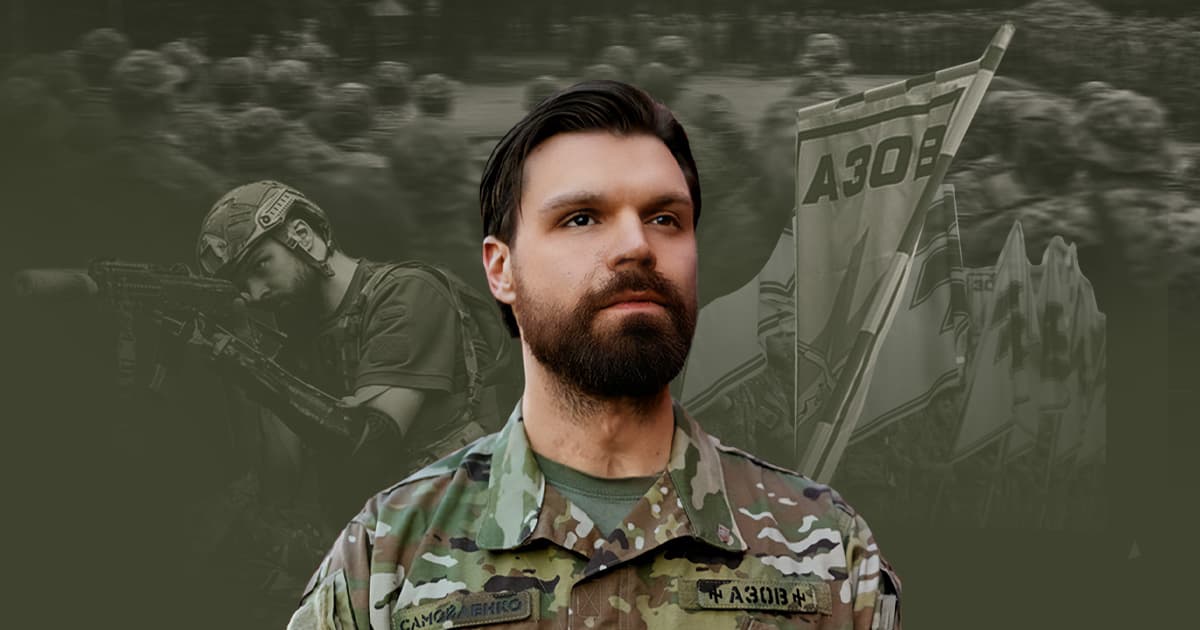
The Azov Assault Brigade of the National Guard of Ukraine has always been a subject of debate in Ukrainian society and abroad. For years, Russian propaganda has been trying to discredit the unit so that it could not receive weapons or financial support. Despite this, the Azov defended the besieged Mariupol for 86 days in 2022, and before that, in 2014, liberated it from the Russian military.
Svidomi talked to Illia Samoilenko, an officer of the Azov Intelligence Department, to find out how the unit differed from other volunteer formations, why Russia discredited military formations in Ukraine and how Ukrainian society can help release prisoners.
*Illia Samoilenko, an officer of the Azov Intelligence Department, took part in the war in eastern Ukraine. In 2017, he was wounded, injuring his left arm, leg, neck, face and eye. From the beginning of the blockade of Mariupol, he worked at Azovstal. In May 2022, he left the plant's premises on the order of Ukraine's highest military and political command. He was held in captivity until September 21, 2022.
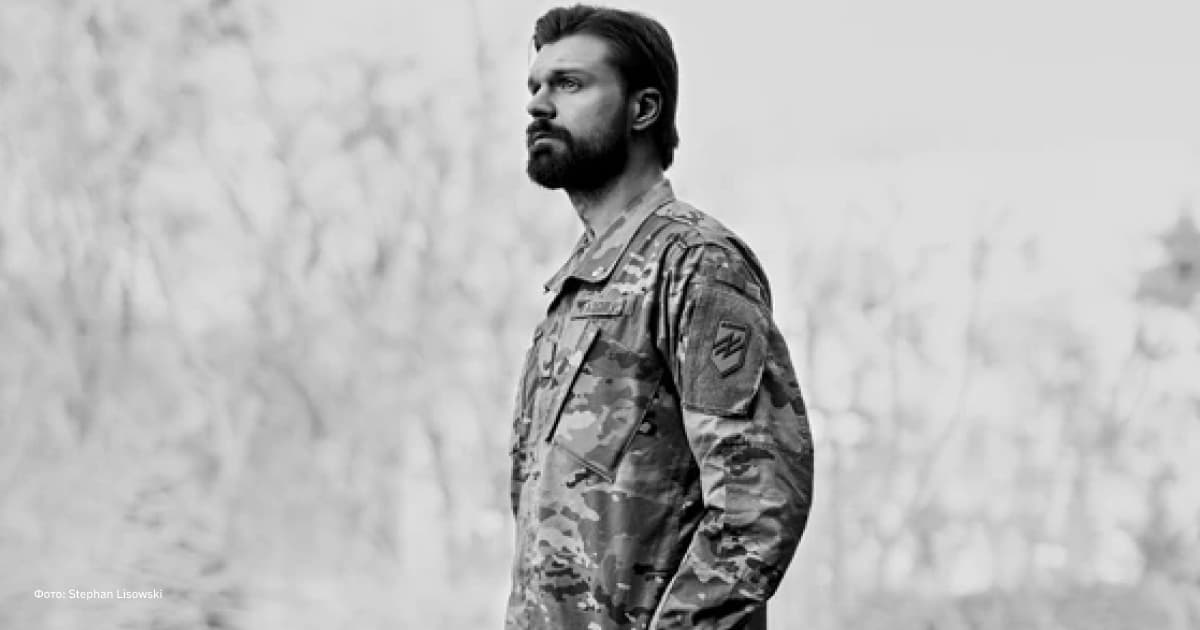
Tell us about your childhood. What was it like?
There were certain distinct things in my childhood. Firstly, I was raised by parents with a clear understanding of how a person should behave, be educated, and learn new things.
Secondly, nothing goes unnoticed, and nothing happens for nothing. That is why boys' war games sometimes have a certain continuation.
Secondary and higher education helps to formalise education ideologically and conceptually. In general, an integral part of upbringing is proper education, which gives an understanding of the historical context, events, patterns, how this [a particular process] goes and what it leads to.
You studied at the Faculty of History of the Taras Shevchenko National University of Kyiv. Why did you choose the profession of a historian?
Since childhood, I have been fond of history, in particular military history — equipment and various military tactics. I can't say I prepared for this [entering the Faculty of History], but it was interesting. It kept my attention and fascinated me.
In your second year, you stop studying and join Azov. Why did you choose it rather than another unit?
It was a matter of my historical hobby. I understood that highly motivated, passionate people united by a common goal would be a good place to be.
2014 Azov was slightly different than when I joined the service in 2015. But this tremendous work that has been done since then is the result of the work and merits of the people who were in it, who started it and fought there.
It attracted many people with similar mindsets — idealists, patriots, people who love their country, remember its history and know what [historical] mistakes cost.
How was Azov different from other volunteer units and the Armed Forces?
We [in society] tend to perceive volunteer units as homogeneous, a common category, but each is different. Each unit has its policies, perception and traditions.
I studied military planning and how to use weapons and equipment as a scholar. When I saw the results of combat work, I realised that those people [Azov] knew how to work. It's not just the determination inherent in all volunteer units — it's the desire for systematicity and organisation.
How was it possible to develop a highly disciplined unit?
There are military methods of building discipline, which are described in the charters. There are professional and leadership methods of building discipline, and there are specific ones, such as combat camaraderie, the spirit of the unit, its traditions, and an understanding of the importance of their work. When discipline comes naturally from within a person, from their motivation, it is much better than when imposing discipline.
We have learned a lot from different armies worldwide, including how to build military discipline. It depends on the authority of the commander. When Redis (Denys Prokopenko's callsign — ed.) became commander, we did a lot of work to maintain a unified level of knowledge and develop new initiatives, the officer and sergeant corps.
Motivation, personal responsibility, camaraderie, the authority of the commander, and the application of the experience of the world's leading armies help to build a highly disciplined unit as well as historical background because many sources of inspiration can be found in history; both our own and foreign.
What human qualities foster in the unit? Who cannot join the Azov 'family'?
We encourage honesty and decency to create an elite military class in Ukraine.
Firstly, it is trust in each other. If you ruin trust, it is difficult to restore it. It is the price of a mistake. Secondly, people who work well and selflessly take root here. Freeloaders are not welcome here. We cannot have people who do not want to fight. This desire to fight already creates the right fighting spirit.
On the other hand, if a person comes to us without certain qualities, as we call it, a blank slate, but wants to defend the country, to win back what is theirs and chooses us, we will help.
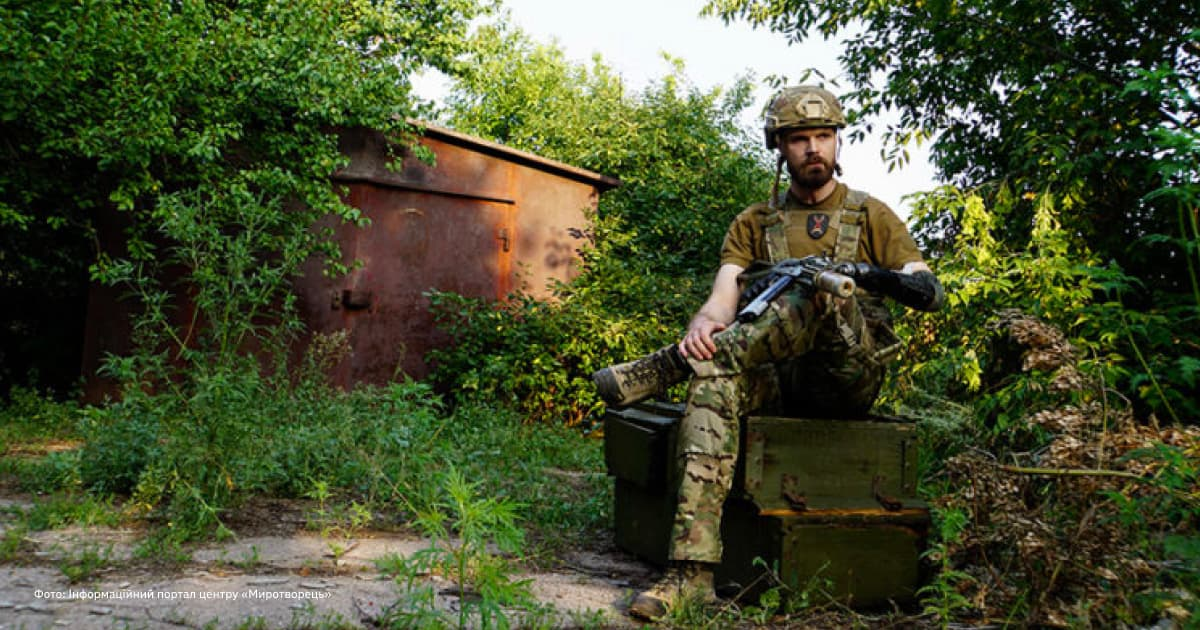
Russian propaganda targeted the regiment, and later, Western and some Ukrainian media began to write negatively about the unit. In your opinion, why did this happen? What influenced it?
In 2014, the Russians tried to defame any Ukrainian military units, including volunteer units, presenting us as illegal immigrants, bandits and marginalised people. They discredited the Ukrainian army so that we would have less support in the West.
Now the Russians carry on doing this. They have launched a large-scale "denazification operation". They call all Ukrainians Nazis, neo-Nazis and nationalists.
Initially, their idea was to blacken us [volunteer units] as much as possible so that we would spend time justifying ourselves. Even the fact that we are discussing this issue now suggests that, in a sense, they have succeeded.
How did this image affect the regiment? I know that the regiment could not receive American weapons. Were there other things that were less publicised?
Firstly, this is more of a problem for the political establishment in the United States. Russians influence both Democrats and Republicans. Secondly, there have been a lot of fakes and hits in the Ukrainian information space.
But it's unfair to say that it was just us. A similar situation occurred with the Right Sector, the UVC (Ukrainian Volunteer Corps), the UVA (Ukrainian Volunteer Army), the Shakhtar and Donbas battalions, and the military, who became politicians.
We have always aimed at fighting. Our veterans who retired from service have been engaged in various activities. These are independent vectors. Many combined them and used them for speculation.
I cannot say that impacted the unit at that time. When another political scandal developed, we trained.
At the time, there were a lot of fakes about us being part of a private army. This was actively used by Russian propaganda. In general, the influence of Russians on the Ukrainian information space was quite significant. It still exists even now.
Does this myth about Azov still exist, particularly among foreigners? After all, society has been actively trying to communicate these points
If citizens are ready to stand up for us, work and help with public advocacy to break this stigma, it's great. What should be done to do this? Use information from trusted sources.
Trusted sources are our official resources. It is the 12th Brigade of the National Guard of Ukraine Azov. We have official accounts on Instagram, Telegram, a YouTube channel and a website. We also have a platform for public initiatives called AzovOne. No one can help us but ourselves. It is the reality.
Don't you think that Ukrainian civil society started fighting the consequences of this image too late?
It took a lot of people dying.
As a historian, can you analyse how the regiment influenced this war and military affairs in general in the historical context?
We are not used to evaluating our actions ourselves because we are biassed and cannot objectively assess our actions and results. It is for history to judge. But looking back at how long the defence of Mariupol lasted, how much equipment and personnel [the Russians] destroyed, and how many forces we blocked, we can say that we won at least two months for the country so that other units could catch their breath and recover from the first attack.
There are many lessons to learn and conclusions to draw. And we continue to fight because only the battlefield holds the key to solving all our problems and issues.
How does the absence of a commander affect the unit?
It is not good. However, we have fully resumed the work of all services. We have an acting commander, Bohdan 'Tavr' Krotevych, Mykyta Nadtochii (acting chief of staff — ed.), and a brigade command staff. We are actively recruiting and collecting money. With people's support, we are staffing the unit. We had to start from scratch, including the work of some services.
From a moral point of view, prisoner-of-war exchanges help. Our people are the most essential resource. As long as they are in captivity, we cannot fully recover. Our war is far from over, and some of our best soldiers are in captivity. The sooner they are returned, the better it will be for the defence.
The return of Redis from Türkiye would be of great benefit (the interview was recorded before the Azov commanders returned from Türkiye - ed.) in the context of the upcoming counter-offensive. He is a talented military commander. In addition, it is an additional motivational factor for both old Azov fighters and recruits.
He is not at a resort but still a prisoner of war in different conditions and in a foreign country. So are the other commanders.
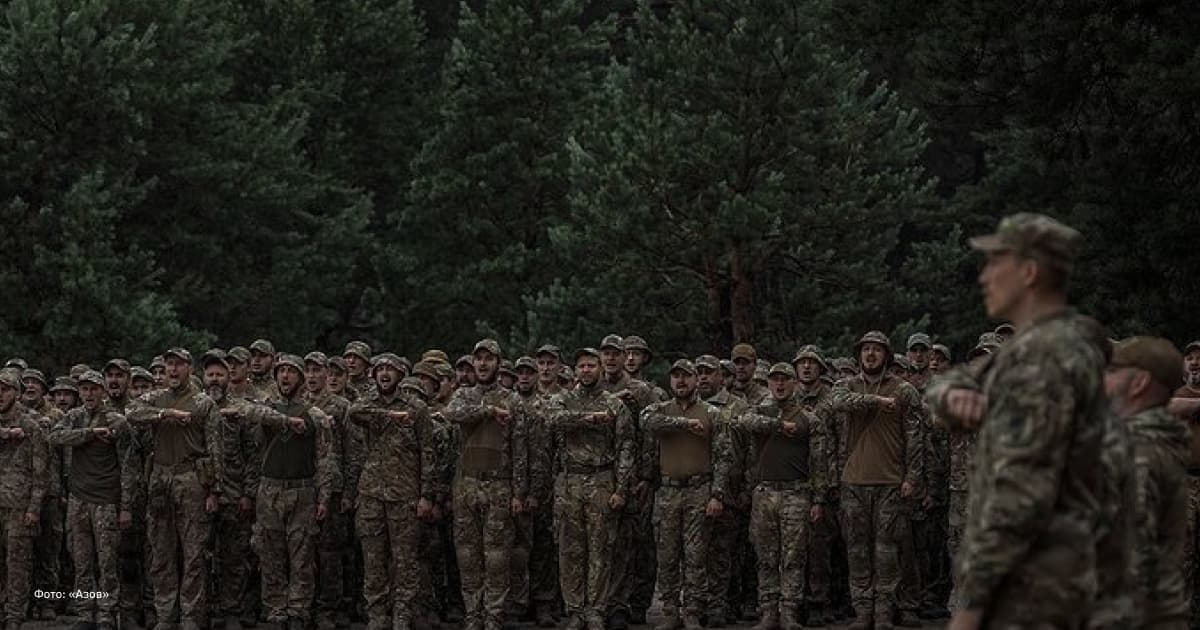
Can I ask you a question about the captivity? In particular, I am interested in how this narrative about Azov influenced the Russians who followed you.
Those people who were exchanged in September have different experiences from those who are still in captivity. We prefer not to talk about it, because it may affect the people's stay there.
Captivity is hard. The Gulag is the Gulag.
How did the attitude towards the Azov and other military differ?
The short answer is that it does. As a rule, for the worse. It all depends on where a person goes.
What can Ukrainian society do to help free the prisoners?
As a military man, I believe the solution to our problems lies on the battlefield. The sooner we recapture the territory and push back the enemy, the sooner we can bring our people back.
I'm not saying that we don't need to return them. It is necessary. That's why people need to be constantly aware of this. Newsworthy events do not last long. Information tends to be forgotten because there is a routine, and people get used to the war. It's already a routine for them. But this should not be the case.
How can citizens make an impact? First, by going to war. As a military man, I see a military solution. If I were a diplomat or a politician, I would suggest other mechanisms and options.
You can "spin up" the issue of exchanging prisoners of war for people important to Russia, as was the case with Medvedchuk. FSS agents in cassocks (Ukrainian Orthodox Church of the Moscow Patriarchate representatives — ed.) are a great option.
Has there been any new information about the terrorist attack in Olenivka?
As far as we know, not all victims have been identified.
The Russians carried out a bloody massacre of prisoners, accusing Ukraine. They are actively manipulating this. The lists [of the dead and wounded] are unspecified; they were collected from eyewitnesses. It is difficult to identify the bodies because they are seriously damaged.
Speaking about the image of the enemy, the most erroneous and dangerous idea is that Russia can change.
The idea that Putin is the only one to blame is also wrong. There was no Putin 100-150 years ago. But there was the Ems Decree [a secret decree of Emperor Alexander II of Russia, banning the use of the Ukrainian language in print except for reprinting old documents], the Valuev Circular (a decree issued by Pyotr Valuev, Minister of Internal Affairs of the Russian Empire, forbidding many publications in the Ukrainian language — ed.), and the enslaved Ukrainian population. Three hundred years ago, there was no Putin, but there was the destruction of the Zaporizka Sich, theft and appropriation of our historical heritage, history and national memory.
In a way, the Russians have achieved their goal because now, in Ukraine, there are, as they say, mankurts (people without memory, submissive slaves — ed.), people who have no national dignity, no respect for their people and country. They think that their stomach, personal gain and comfort are more important. The war concerns everyone. Those who believe they can stay away are not working for victory.
People looking for excuses why they shouldn't fight and don't need to be involved in the active development of civic initiatives are weak. These are not the people who build the right future. And we can only have one future — victory.
If people think they can just watch history being made, they are a passenger, a spectator. And we [in Ukraine] live in such times that we need determined people. Many people have yet to realise what they are capable of. They simply haven't tried, are looking for excuses, and consider themselves weaker or smaller. But they are not.
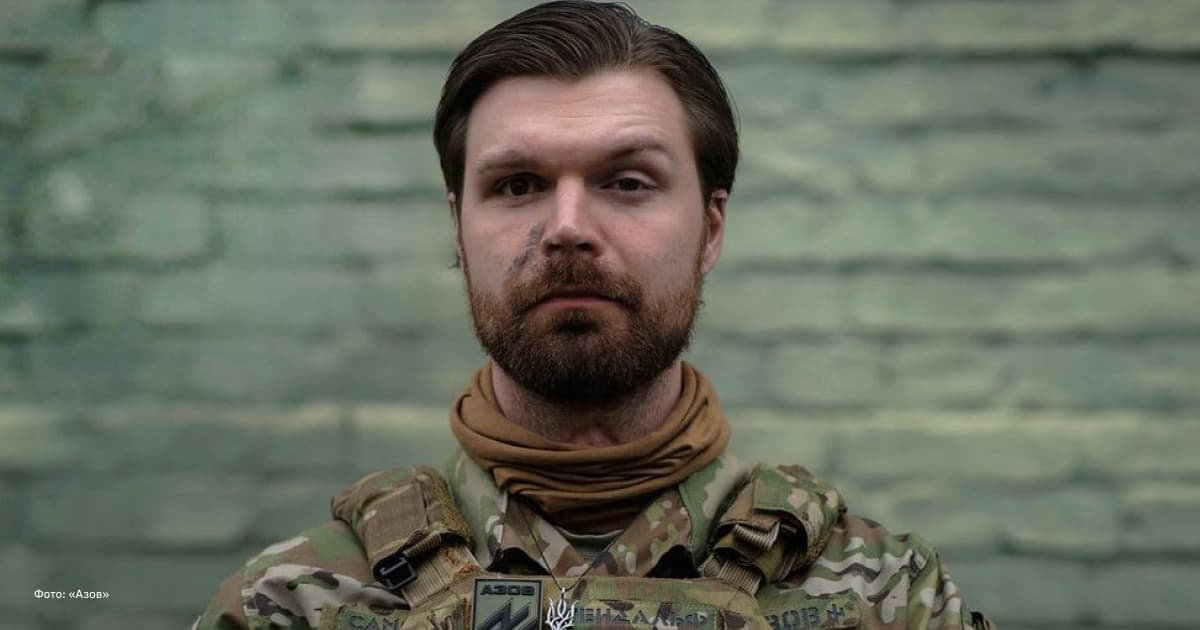
We are working to show that everyone is essential and can be helpful. The army is not Call of Duty, where you have to run around with a machine gun and throw grenades. It is untrue if a typical IT guy, graphic designer, or film editor thinks he cannot be a military man. If, for example, an ordinary student or worker feels they cannot be soldiers because they don't know or can't do something, we will teach them.
We do not grind people through a meat grinder. We do not "plug holes" at the front, but train and educate them, because people are the most significant value.
We have drawn many conclusions from the nature of the fighting in Mariupol to perform the task most efficiently, rather than boldly breaking forward, thinking we can take enemy positions in a rush.
War is brutal, but it can be learned.
Training and practice determine how well the personnel will be able to perform. You can keep your personnel safe if you correctly know and use the guiding documents.
The Mariupol garrison comprised only 4,500 personnel, including rear units, cooks, clerks and staff. But even in such circumstances, with proper planning, it is possible to deter the offensive actions of an entire army.
Without good management, these are just future wounded and dead who fail certain operations. Therefore, an offensive must be well and thoroughly prepared. Preparation means constantly maintaining the standard at training centres as a cult of teamwork, training and improvement.
Last year, when you were leaving Azovstal, Ukrainians declared their support, including using the 'Idea of the Nation' symbol. How do you feel about this?
The value of the chevron and its importance is extraordinary; it has to be earned. To be proud to call yourself an Azov combatant, you must meet our standards and criteria.
There have been some speculations where people have been pretending to be Azovites. They think it's just an identification that they can put on.
I have a rather negative attitude to insinuations with our symbols. If someone puts the 'Idea of the Nation' in their profile or calls themselves an Azovite on the Internet, another person cannot tell whether they are legitimate [Azovite]. It is how the problem arises.
There is a big problem with the United States. The Americans believe that we [in Azov] have a "kingdom of white-supremacy" (white supremacy in the context of race - ed.) and that we are a model for the right-wing movement. Then some marginalised, and criminal elements (who consider themselves supporters of Azov and use the symbols - ed.) commit terrorist acts. We have nothing to do with these people, but because of them, we do not receive Western weapons, among other things. It's enough for one fool to say, "Oh, these are cool guys, I like them," and you become a victim of cancel-culture.
It's upsetting because we spend a lot of resources on working, training new fighters, getting equipment, and preparing for the offensive and liberation of our lands. Instead, we have to pay attention to what someone says on the Internet.
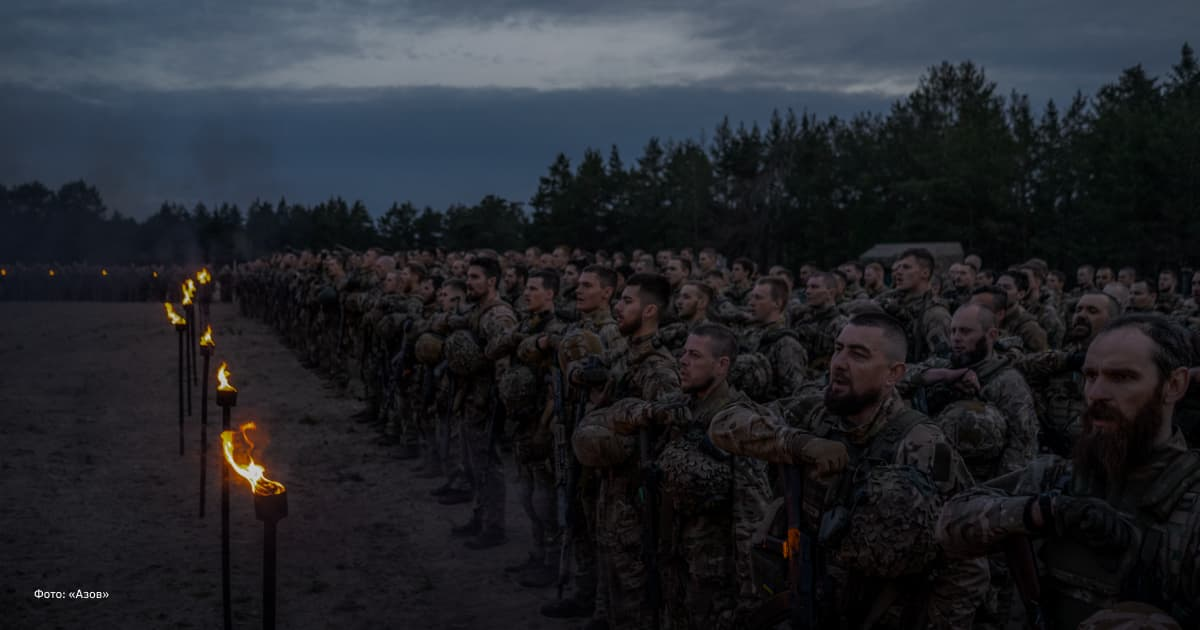
We also have a cult in our country that all the military are saints. It is not true. There are many speculators, liars, and unscrupulous militaries. Many people use trust and collect donations, for example, for fictitious units. It is the ugly truth about reality.
We do not live in a just and kind world. The world is cruel, and we are surrounded by people who often have impure thoughts and are prone to unworthy actions. It is impossible to keep track of everything. While we, the military, fight the enemy on the battlefield, an internal enemy is growing in the rear. So unless people get their heads out of the sand, we face a bleak future.
Even if we win quickly, the problems will not end there. The war will not end, and Russia will not disappear. Even our most cherished dreams of dividing Russia may not come true. And if it does, it may be even more threatening (because it is impossible to predict how it will happen and what consequences it will have for Ukraine - ed.)
We need to understand that in the future, there will be a need for a large number of military personnel, a professional army, where personnel need decent provision, support and treatment.


